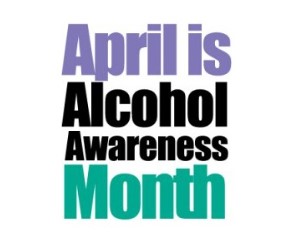
April is Alcohol Awareness Month, dedicated to raising awareness about the dangers of alcohol abuse and promoting strategies for prevention and intervention.
Some research suggests that over 60% of American adults consume alcohol. Because alcohol has become such an ingrained part of our culture. It’s easy to look past its impact on our daily lives. And without us realizing it, we may ignore issues associated with drinking, sweeping them under the rug.
Alcohol awareness involves actively reflecting on our drinking behaviors. It not only sheds light on potential drinking-related problems but also encourages mindfulness regarding alcohol consumption, regardless of frequency or amount.
Even moderate drinking can impact various aspects of our lives, including personal well-being, relationships, work, and health. For instance, a nightly glass of wine might disrupt sleep patterns, or weekend outings could result in Monday morning hangovers.
By assessing how alcohol affects these areas, we recognize problematic patterns, paving the way for adopting more mindful drinking habits.
Here are some questions to ask yourself about your drinking habits:
- Does my drinking affect my performance at work or school?
- Have friends or family expressed concern about my drinking habits?
- Do I experience mood swings, irritability, or fatigue the day after drinking?
- Am I frequently dealing with headaches, hangovers, or other physical effects from alcohol?
- Do I struggle to stop drinking after just one or two drinks?
- What are the main triggers that lead me to drink? Is it stress or peer pressure?
- Do I feel the need to conceal my drinking habits from loved ones?
Regular and proactive self-reflection empowers us to develop strategies for managing and controlling our impulses to drink.
Why Should you Pay Attention to Your Alcohol Consumption?
You may not be ready to completely give up drinking, but you likely want to avoid harmful levels of alcohol consumption. Instead of adopting an all-or-nothing approach, consider practical mindful drinking. This approach finds a middle ground, allowing you to cultivate healthier drinking habits without completely abstaining from alcohol.
Alcohol awareness and mindful drinking are closely intertwined because mindfulness encourages ongoing awareness of alcohol’s impact and prompts reflection on your drinking habits.
Mindful drinking offers many benefits, including:
- Improved clarity and focus
- Better sleep quality at night
- Supports healthy weight management
- Healthier and more youthful looking skin
- Lower blood pressure
How Can I Practice Alcohol Awareness and Mindful Drinking?
Fostering a health relationship with alcohol often begins with actively assessing our drinking habits, cravings, and triggers. This evaluation allows us to develop personalized strategies to reduce our drinking and make more informed choices.
Here are some effective ways to cultivate mindfulness and self-awareness when it comes to drinking:
- Define Your Goals: Determine if you want to quit or cut back on alcohol. Set realistic goals, such as reducing drinking days from three to two per week. Starting with achievable objectives helps sustainability.
- Establish an Action Plan and Boundaries: Create a personalized plan by pinpointing areas of your life negatively affected by alcohol. Set boundaries including when and how much you will drink or designate non-drinking days. For example, establish a cutoff time before bedtime if alcohol disrupts your sleep.
- Track Your Drinking and Progress: Monitor your alcohol consumption to practice mindful drinking effectively. Utilize a drink-tracking app which provides reminders and tools for monitoring habits.
- Identify Personal Triggers and Manage Them: Reflect on what triggers your desire to drink, whether it’s stress, habit, or social pressure. Develop strategies to mitigate these triggers such as choosing alcohol-free venues or surrounding yourself with supportive friends.
- Employee Mindful Drinking Tips: Implement strategies to pace yourself to reduce alcohol intake during social events. Suggestions include alternating between alcoholic and non-alcoholic drinks, eating a substantial meal beforehand, and staying hydrated.
- Seek Professional Help: If alcohol negatively impacts your health, well-being or relationships, seek guidance from professionals of support groups like Alcoholics Anonymous.
- Embrace Progress, Not Perfection: Understand that cutting back on alcohol is a journey with ups and downs. Celebrate small victories and remain patient with setbacks. By making gradual changes, you can develop lasting habits that improve your overall well-being.
Ten Fast Facts about Alcohol
Did you know that …
- Chronic excessive alcohol consumption contributes to 75% of esophageal cancers.
- Heavy drinking is associated with nearly 50% of cancers affecting the mouth, pharynx, and larynx.
- Women who chronically consume alcohol face a 10% increase in their risk of breast cancer.
- Approximately 65% of pancreatitis cases are linked to heavy chronic drinking.
- Among ER admissions for injuries, 47% test positive for alcohol, with 35% intoxicated and 75% of those showing signs of chronic alcoholism.
- Substance abuse in the US leads to more deaths and disabilities annually than any other cause.
- Up to 35% of heavy drinkers develop alcoholic hepatitis.
- Heavy chronic drinking is linked to 36% of primary liver cancer cases.
- Alcoholics are 10 times more likely to develop carcinoma than the general population.
- Alcohol-related accidents are a leading cause of death for teens.
National Council on Alcohol and Drug Dependence, Inc. (NCADD)
References:
